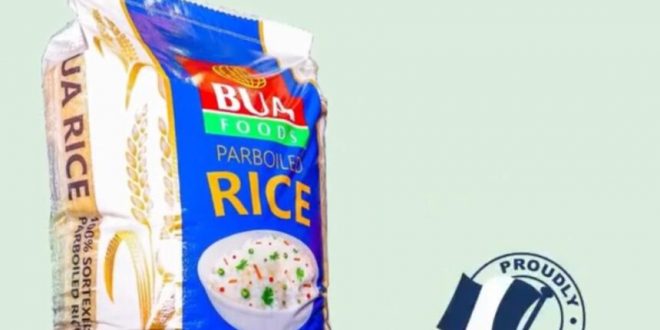BUA’s Rice Revolution: Nigerians Hail Abdulsamad Rabiu’s Bold Move to End Food Hardship

Yes, this is not the first time Alhaji Abdulsamad Rabiu, has rewritten the narrative of suffering in Nigeria’s markets. Nor is it the first time BUA Group has acted as an economic powerhouse and moral compass in a nation frequently staggered by profiteering and policy paralysis. From rice to cement, from sugar to salt, the empire Rabiu has built surpasses soulless accumulation of wealth, it espouses profit with a human face. And in this newest crusade against food insecurity, BUA’s resolve may very well feed the stomach and stir the spirit of an entire nation.
To understand the weight of Rabiu’s latest gesture is to understand the centrality of rice in the Nigerian experience. It is not merely a meal; it is a cultural constant, a culinary anthem across tribes and tongues. When its price soars, so do tempersand tears. But when its cost is brought low, a different kind of revolution begins.
Abdulsamad Rabiu’s vow to crash the price of rice and break the backs of hoarders is nothing short of a national intervention. “Many of those involved in hoarding are crying now and losing money,” he said after a meeting with President Bola Tinubu. “The price of rice going forward will not go any higher than what it is today.”
This is a market prophecy that doubles as a prayer answered. For years, hoarders—unscrupulous profiteers—have bought up harvest-season rice, waited out scarcity, and sold it back at extortionate rates. While they thrived, the people groaned. But with BUA’s strategic importation, domestic sourcing, and production scale, the weaponization of hunger is meeting its match.
What makes this move particularly appreciable are the economics and ethics behind it. Rabiu is not simply shaving profit margins or outperforming competitors. He is redefining the purpose of enterprise. As he said, “It is important to protect our farmers, but at the same time, we also have 250 million Nigerians who are paying a lot more than they should be paying.”
Herein lies the moral force of BUA Group, an institution that has never forgotten the pains of the street while sitting at the summit of industry. With each decision that puts people over profit, Rabiu asserts a rare creed: capitalism must serve, not enslave.
His warning to hoarders has been widely applauded as both an economic forecast and a patriotic gesture. In the face of hunger, silence is complicity. And neither Rabiu nor BUA Group would be complicit.
This is not the first time Abdulsamad Rabiu has reached into the furnace of national need and drawn out a gem of generosity. From massive CSR interventions in healthcare and education to the $100 million Africa Fund he launched to support health and social welfare across the continent, his name is written in the ledgers of compassion.
During the COVID-19 pandemic, BUA donated billions in equipment, test kits, ambulances, and support to medical institutions nationwide. In the raging storm of a global health crisis, Rabiu stood like a lighthouse—unshaken, illuminated, and guiding.
And even beyond emergency responses, the BUA Foundation continues to build world-class hospitals, fund scholarships, and invest in capacity-building for youth and SMEs. With Rabiu’s latest move on rice, the whole agricultural chain stands to benefit. His leadership is not that of the distant tycoon but of a man whose hands remain stained with the soil of national responsibility.
There is no gainsaying Rabiu is a figure worth more than applause.
Rabiu is undoubtedly a benevolent African titan; his business culture fosters a universe where empathy meets enterprise, and impact is measured not only in shares but in shelter, sustenance, and salvation.
He must be celebrated not just for his wealth, but for his willingness. Not for the height of his towers, but for the warmth of his touch. Not just for what he builds, but for what he gives away.
The impact of BUA’s rice price revolution cannot be overstated. It reshapes household budgets. It revitalises school feeding schemes. It resurrects culinary businesses strangled by inflation. It reawakens local economies that orbit around rice distribution.
For families that count every grain, for traders whose fortunes swing with rice prices, for millions who see rice not as a luxury but as a necessity, Rabiu’s move is deliverance.
The ripple effect travels deep. Children return to school with better-fed minds. Hospitals see fewer hunger-related cases. Conflict-prone areas grow calmer as economic pressure eases. Hope returns, like rain after a dry season.
And perhaps most importantly, it sends a signal to other magnates: that wealth finds its noblest expression in service to the vulnerable.





